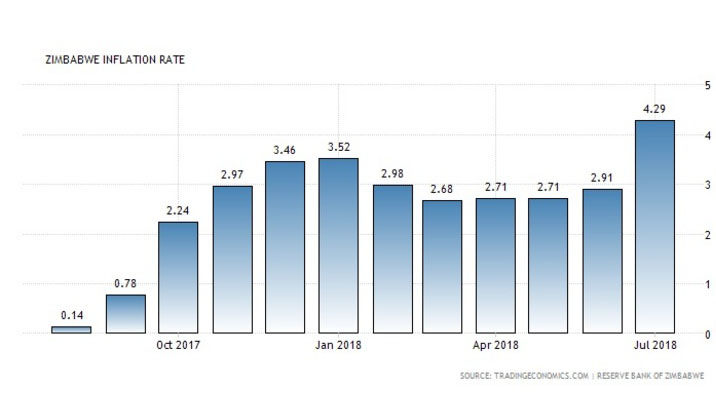
The Sunday Mail

Zimbabwe’s inflation figures have in recent months shown a steady increase and economists warn that the numbers could rise even further in the short-term as economic fundamentals correct themselves.
Each month, a host of prices for a select number of goods and services are analysed by statisticians from the Zimbabwe National Statistics Agency (ZimStat) to measure the rate of increase or decline.
This basket of goods and services is often called the CPI basket, and is the one generally used to calculate inflation.
Each item in the basket carries a certain amount of importance termed “weighting”.
Now, economists say the current CPI basket weighting might be faulty, because it gives more weight to goods that rely more on Government subsidies compared to those that do not.
“There is an understatement of inflation in the economy,” according to Emergent Research, a South African-based research firm.
“The CPI basket is dominated by basic commodities, which are funded by the RBZ providing currency to import these on a 1:1 basis,” the analysts said in a new report — ‘Zimbabwe, a Return to Normalcy’.
“Other commodities are priced at the parallel market rates, but have lower weighting in the CPI basket,” it added.
Prior to dollarisation, Zimbabwe reported its worst inflation ever, hitting 231 million, according to official data.
Eventually, the ZimStats gave up production of the statistics altogether because the agency couldn’t keep up with the rate of price increases that changed several times daily.
After the US dollar was made the country’s official currency in 2009 — along with a host of other foreign currencies — inflation retreated into deflation as prices in dollar terms normalised.
A strengthening dollar at the time aided the deflationary pressure until 2015 when prices started to rise.
According to the Emergent Research report, Zimbabwe’s inflation has remained repressed as with all dollar denominated economies.
For the month of July, the annual inflation rose 1,38 percent to 4,29 percent, the highest in eight years.
In June, inflation fluctuated at 2,91 percent.
The Zimstats says month-on-month, inflation rose 1,03 percentage points to 0,98 percent.
Some observers have attributed the quickening inflation to the continuance of the parallel currency market.
Zimbabwe currently uses a basket of currencies dominated by the US dollar, as well as the bond notes, which are guaranteed by an international financial organisation.
Economist and National Business Council of Zimbabwe president, Mr Langton Mabhanga said the increase in inflation is inevitable, with disposable incomes increasing and pushing the prices of goods higher.
New projects are being launched, while others have been resuscitated or expanded, thereby creating thousands of jobs.
Gold and tobacco production have soared, with tobacco hitting 250 million kg worth $730,7 million during the 2018 marketing season.
Gold is forecast to beat the 24-tonne target this year.
Mr Mabhanga said there is need to increase production and stop capital flights by cutting on imports for the country to maintain inflation at sustainable levels.
“The key issue is on production. Let us increase production, promote local consumption as well as beneficiate land export finished goods,” he said over the telephone.
“There has been increased economic activity, which is increasing disposable incomes. But we need to work on cutting cheap imports which are used as a medium of capital flight,” he said.
Cash shortages have fuelled the parallel market although the Reserve Bank of Zimbabwe (RBZ) has pegged and maintained the US dollar-bond note official rate at 1:1.
Mr Mabhanga said this means the US dollar is still in circulation, and that its high demand by both companies and individuals will continue to push up the exchange rate.
The recently held harmonised polls, seen as a gauge to investor confidence, among other factors, will likely impact inflation going forward, analysts say.
In turn, this could see a fall in exchange premiums on bond notes and RTGS balances against the US dollar.
“Two divergent factors are poised to impact inflation going forward. Credit inflows and enhanced liquidity has the effect of enhancing risk appetite, thereby reinforcing spending and increasing asset prices, which all fuel inflation.
“Aggregating the effect, we anticipate a fall in inflation in the short term as imports fall in price. As liquidity and credit flows in, inflation may start to edge up as demand goes up, thereby pushing up some of the prices,” said Emergent Research.
A cut in the exchange premium will lower the cost of imports and ultimately landing prices of imports in Zimbabwe.



